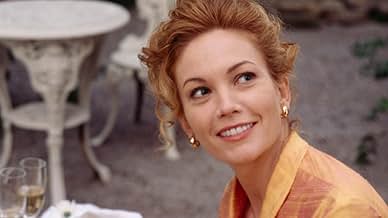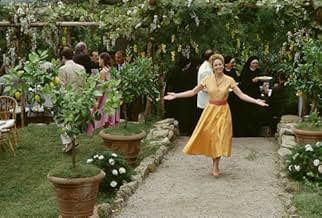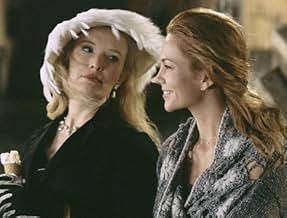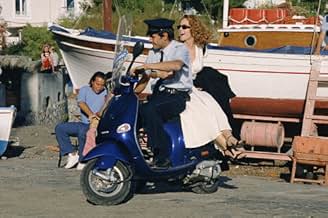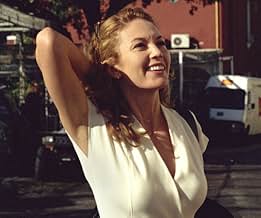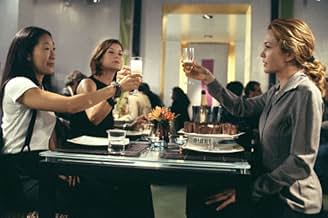Una scrittrice acquista d'impulso una villa in Toscana per cambiare la propria vita.Una scrittrice acquista d'impulso una villa in Toscana per cambiare la propria vita.Una scrittrice acquista d'impulso una villa in Toscana per cambiare la propria vita.
- Premi
- 5 candidature totali
Giulia Louise Steigerwalt
- Chiara
- (as Giulia Steigerwalt)
Recensioni in evidenza
7=G=
In "Under the Tuscan Sun", a recently divorced American writer/critic (Lane) ventures to Italy where she sets about putting the pieces of her shattered life back together in the rustic, bucolic, scenic countryside of Tuscany. Lane registers a fine performance in this lighthearted drama spritzed with humor and romance which is as lovely as it is clumsy. Obvious in its attempts to tug at the heart-strings of romantics with all the expected Italian stereotypes and cliches, this flick received mixed reviews and will resonate most with more mature sentimentalists. Those who enjoy this film may want to check out V. Redgrave in "A Month by the Lake" (1995). (B)
It's a story about how people who want things badly rush themselves into experiences that are worse than their previous ones. It's a good movie with several deep messages. The movie also has a certain atmosphere that makes you feel as if you are in Tuscan on a trip yourself. I have to disagree with the view that says you need to be in love to enjoy the movie. All what you need is some depth and you will definitely relate to the protagonist. She happens to be healing from a failing marriage but you can relate to her story if you are dealing with any kind of problems in your life.
There is one specific part of the movie which I truly like is the one where she defends the love story of a young couple though she was hurt. This shows that even though she failed she didn't cease to believe in love. She succeeded in going out of the egocentricity of a person who usually hates good for people if his life is not working successfully.
There is one specific part of the movie which I truly like is the one where she defends the love story of a young couple though she was hurt. This shows that even though she failed she didn't cease to believe in love. She succeeded in going out of the egocentricity of a person who usually hates good for people if his life is not working successfully.
So, I've heard this film got the beating because it wasn't like the book? Ah, well, trust me; I'm a huge book-lover (and Harry Potter fan), so I can say that if I had read the book and was an immense fan, I probably wouldn't have liked the film if it had taken the basis out of the original story. I truly sympathize with those of you who disliked this film because it did not go with the book in some way or another. ;)
Although, since I love writing myself, I have a very wonderful relationship with this film and its delicious scenery, how the characters in it build in confidence, and the whimsical things that seem to be thrown in it artfully. Yes, there are some so-called "cliches", which is a word I hate using. We use that word to describe things that happen every day in our life, things that repeat themselves in storybooks and films and are heard so often that we are likely to vomit with expectancy of it all. But the thing that hit me about this film is that a lot of things happen that you really don't expect. The coming-of-age story has been told for ages, and will be expressed forever, with all its little tidbits of similar goings-on (serious situation happens, main character finds escape, love, broken heart, confusion..etc.). I don't think an entire genre of literature can deny its existence, now, can it? :)
The acting is superb, and it has a lot of light-hearted moments that lift it up. It's basically about accepting yourself before you can truly find "Mr.Right", and realizing that you shouldn't put the blame on yourself for every single thing in your life that happens, and about taking chances because life can have pros and cons. I even think that some men would like it. This film was very inspiring to me, and although I didn't see it in theaters, I left my couch feeling very creative and content, as if I wasn't the only one who got inspiration from the little things life seems to hand out.
Although, since I love writing myself, I have a very wonderful relationship with this film and its delicious scenery, how the characters in it build in confidence, and the whimsical things that seem to be thrown in it artfully. Yes, there are some so-called "cliches", which is a word I hate using. We use that word to describe things that happen every day in our life, things that repeat themselves in storybooks and films and are heard so often that we are likely to vomit with expectancy of it all. But the thing that hit me about this film is that a lot of things happen that you really don't expect. The coming-of-age story has been told for ages, and will be expressed forever, with all its little tidbits of similar goings-on (serious situation happens, main character finds escape, love, broken heart, confusion..etc.). I don't think an entire genre of literature can deny its existence, now, can it? :)
The acting is superb, and it has a lot of light-hearted moments that lift it up. It's basically about accepting yourself before you can truly find "Mr.Right", and realizing that you shouldn't put the blame on yourself for every single thing in your life that happens, and about taking chances because life can have pros and cons. I even think that some men would like it. This film was very inspiring to me, and although I didn't see it in theaters, I left my couch feeling very creative and content, as if I wasn't the only one who got inspiration from the little things life seems to hand out.
Romance . It is the first conclusion and it is far to be wrong. But... . It is more. Because it is a sweet exploration of the second chance. Because...Tuscany, the real lead character. Because...lovely performances and the taste of coffee with few cinnamon flavor. And because, in many scenes, it could be your dream in facts. And, sure, because Diane Lane. So, just lovely.
"Under the Tuscan Sun" is a polarizing film that seems to leave viewers (and critics) either in love with a story of growth and renewal or dismissive of its line. I'm firmly in the former camp.
Based so loosely on Frances Mayes's own account of her regeneration in beautiful Italy as to carry an end credit pronouncing that substantial fictionalization replaced key true details, writer and director Audrey Wells crafted a stunning vehicle for Diane Lane whose radiance projects from the screen powerfully. And in every scene.
Diane Lane, as the changed-from-the-memoir Frances, abandons San Francisco after her never shown cad husband divorces her, getting the house she once loved. Frances is a writer and literary critic. Why does she leave S.F.? Two of her closest friends give her a ticket for a gay bus tour of Italy and she jumps off the bus to look into a ramshackle old country house up for sale. Impetuosity? Definitely. Believable? Yes, actually.
Frances' new house isn't a handyman's special, it's a contractor's assurance of food on the table for a very long time. Frances adapts to the house and the locals with remarkable aplomb. Tuscany is sunny but its light fades before Frances's challenged but resilient commitment to not just restore a house but to create a home. The two aren't the same. I'm not sure how many male directors could so well create that reality.
Director Wells tells the story from a woman's heart but with a breadth of humor and drama that should appeal to anyone who wants to believe, or needs to hope, that there really is a light at the end of the tunnel of marital infidelity and dissolution.
Supporting Diane Lane is Sandra Oh as Patti, her closest friend. In relatively short scenes, Ms. Oh displays a lively and laconic grasp not only of her friend's life but also of her own which is not, as they say today, devoid of "issues."
Lindsay Duncan is Katharine, an older woman determined to hold on to her now fading attractiveness through a blend of humor, earthiness - and alcohol. Her character may be predictable but she's also fun.
Raoul Bova has garnered some press attention as handsome Marcello, the romantically available and affluent Italian. That's a character we've seen in many, many films and Bova delivers an expectedly satisfactory but hardly deep performance.
Yes, Diane Lane is beautiful but there is much more to her acting than a shining appearance. Her facial gestures, mirroring her emotions as they shift from moment to moment, are the product of extraordinary acting ability. And her character draws a powerful portrayal.
Credit also must go to cinematographer Geoffrey Simpson. Perhaps it would be impossible for a blind camera director to turn in anything but a gorgeous visage of rural and urban Italy but Simpson did do a marvelous job of making the locales come alive.
This is a film for adults, for people who can understand pain and the search for recovery and understand the difficulty of coming back from a space that once offered the mirage of safety and security.
I loved this film.
9/10.
Based so loosely on Frances Mayes's own account of her regeneration in beautiful Italy as to carry an end credit pronouncing that substantial fictionalization replaced key true details, writer and director Audrey Wells crafted a stunning vehicle for Diane Lane whose radiance projects from the screen powerfully. And in every scene.
Diane Lane, as the changed-from-the-memoir Frances, abandons San Francisco after her never shown cad husband divorces her, getting the house she once loved. Frances is a writer and literary critic. Why does she leave S.F.? Two of her closest friends give her a ticket for a gay bus tour of Italy and she jumps off the bus to look into a ramshackle old country house up for sale. Impetuosity? Definitely. Believable? Yes, actually.
Frances' new house isn't a handyman's special, it's a contractor's assurance of food on the table for a very long time. Frances adapts to the house and the locals with remarkable aplomb. Tuscany is sunny but its light fades before Frances's challenged but resilient commitment to not just restore a house but to create a home. The two aren't the same. I'm not sure how many male directors could so well create that reality.
Director Wells tells the story from a woman's heart but with a breadth of humor and drama that should appeal to anyone who wants to believe, or needs to hope, that there really is a light at the end of the tunnel of marital infidelity and dissolution.
Supporting Diane Lane is Sandra Oh as Patti, her closest friend. In relatively short scenes, Ms. Oh displays a lively and laconic grasp not only of her friend's life but also of her own which is not, as they say today, devoid of "issues."
Lindsay Duncan is Katharine, an older woman determined to hold on to her now fading attractiveness through a blend of humor, earthiness - and alcohol. Her character may be predictable but she's also fun.
Raoul Bova has garnered some press attention as handsome Marcello, the romantically available and affluent Italian. That's a character we've seen in many, many films and Bova delivers an expectedly satisfactory but hardly deep performance.
Yes, Diane Lane is beautiful but there is much more to her acting than a shining appearance. Her facial gestures, mirroring her emotions as they shift from moment to moment, are the product of extraordinary acting ability. And her character draws a powerful portrayal.
Credit also must go to cinematographer Geoffrey Simpson. Perhaps it would be impossible for a blind camera director to turn in anything but a gorgeous visage of rural and urban Italy but Simpson did do a marvelous job of making the locales come alive.
This is a film for adults, for people who can understand pain and the search for recovery and understand the difficulty of coming back from a space that once offered the mirage of safety and security.
I loved this film.
9/10.
Lo sapevi?
- QuizThe elderly owner of Bramasole, grateful for a sign that Frances is the "right" buyer, cries out, "Grazie, Santo Francesco!" when a bird defecates on Frances' head. "Santo Francesco" is Saint Francis, the patron saint of animals.
- BlooperWhen Signor Martini is next to the fireplace telling Frances about the train tracks through the mountains, the matchbox behind him moves around the top of the fire place.
- ConnessioniFeatured in Late Night with Conan O'Brien: Diane Lane/Wanda Sykes/Jonny Lang (2003)
- Colonne sonoreSaturday Night (Is the Loneliest Night in the Week)
Written by Sammy Cahn and Jule Styne
Performed by The Oscar Peterson Trio
Courtesy of The Verve Music Group
Under license from Universal Music Enterprises
I più visti
Accedi per valutare e creare un elenco di titoli salvati per ottenere consigli personalizzati
Dettagli
- Data di uscita
- Paesi di origine
- Lingue
- Celebre anche come
- Bajo el sol de Toscana
- Luoghi delle riprese
- Aziende produttrici
- Vedi altri crediti dell’azienda su IMDbPro
Botteghino
- Budget
- 18.000.000 USD (previsto)
- Lordo Stati Uniti e Canada
- 43.610.723 USD
- Fine settimana di apertura Stati Uniti e Canada
- 9.751.425 USD
- 28 set 2003
- Lordo in tutto il mondo
- 58.878.723 USD
- Tempo di esecuzione1 ora 53 minuti
- Colore
- Mix di suoni
- Proporzioni
- 1.85 : 1
Contribuisci a questa pagina
Suggerisci una modifica o aggiungi i contenuti mancanti

Divario superiore
By what name was Sotto il sole della Toscana (2003) officially released in India in Hindi?
Rispondi


